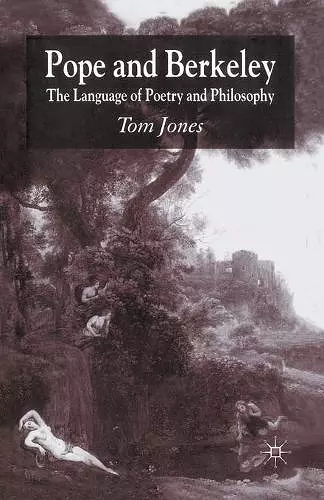Pope and Berkeley
The Language of Poetry and Philosophy
Format:Paperback
Publisher:Palgrave Macmillan
Published:1st Jan '05
Should be back in stock very soon
This paperback is available in another edition too:
- Hardback£44.99(9781403941725)

Springer Book Archives
The first study dedicated to the relationship between Alexander Pope and George Berkeley, this book undertakes a comparative reading of their work on the visual environment, economics and providence, challenging current ideas of the relationship between poetry and philosophy in early eighteenth-century Britain.The first study dedicated to the relationship between Alexander Pope and George Berkeley, this book undertakes a comparative reading of their work on the visual environment, economics and providence, challenging current ideas of the relationship between poetry and philosophy in early eighteenth-century Britain. It shows how Berkeley's idea that the phenomenal world is the language of God, learnt through custom and experience, can help to explain some of Pope's conservative sceptical arguments, and also his virtuoso poetic techniques.
' ... combines philosophy and poetical theory and history to answer the question from An Essay on Criticism about how it might be possible for the sound to echo the sense ... Jones looks at contemporary linguistic theory to contextualize the arguments and techniques of Pope's poem. He reviews the existing evidence on the friendship between and interinfluence between Pope and George Berkeley; outlines Pope's readings in linguistics, from Locke and Plato's Cratylus, to Michel de Montaigne, Thomas Hobbes, and Bayle ... Jones's study is particularly useful because too often both philosophy and poetry are treated in separate vacuums.'
Professor Cynthia Wall (University of Virginia), 'Recent Studies in the Restoration and Eighteenth Century', Studies in English Literature 1500-1900, 46:3 (Summer 2006), 657-733, p. 689.
'In this fascinating study Tom Jones makes a case for recognising George Berkeley as a significant influence on Pope's thought. He challenges the common assumption that although the poet admired Berkeley as a human being he was unsympathetic to his ideas - an assumption deliberately fostered, Jones suggests, by those guardians of Pope's posthumous reputation, Bolingbroke and Warburton. The book is explicatory in its approach, placing Berkeley's idealist version of empiricism in context and summarising helpfully as it goes. '
Professor David Fairer (University of Leeds), Forum for Modern Language Studies, 42:4 (October 2006), 464-5, pp. 464-5.
ISBN: 9781349521029
Dimensions: unknown
Weight: unknown
203 pages
1st ed. 2005